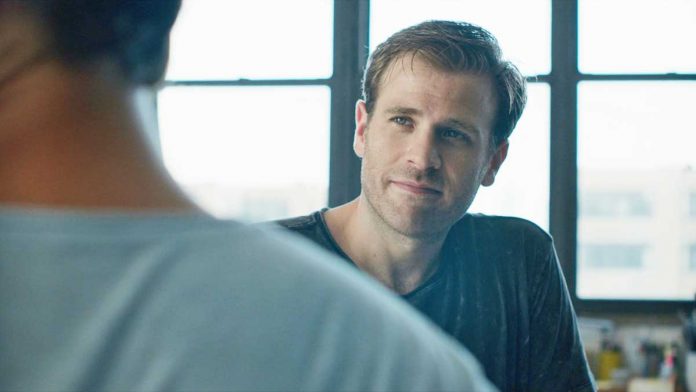Out actor Scott Evans gives a sensitive, ingratiating performance in the genial new film, “Almost Love,” available April 3 on demand.
Evans headlines as Adam, a painter who creates work for Ravella Brewer (Patricia Clarkson) a famous artist, to sell under her name. It’s a form of professional “invisibility,” but Adam also feels obscured five years into his relationship with Marklin (out actor Agustus Prew), an internet influencer. [Fun Fact: Evans and Prew also co-star in the naughty gay thriller “Midnight Kiss” now available on HULU for anyone who wants a double feature starring these actors.]
How Adam handles his crises — work, his relationship with his partner, and a tense scene with his father (John Doman) — allows Evans to shine in this ensemble film. Out writer and director Mike Doyle depicts a handful of gay and straight New Yorkers striving for something more, while negotiating what they have.
In a recent phone interview, Evans chatted about making “Almost Love.”
Adam is stuck; he can’t let go of things. To me, he “chooses to fool himself,” as his friend Elizabeth (Kate Walsh) suggests. What observations do you have about his character?
Are you describing me? [Laughs] I think Adam is…I’ve been there. I’m possibly there right now! Nothing seems to be going his way, but it’s hard to feel sorry for yourself when life isn’t so bad. The characters are all coming to a crossroads at once. When Elizabeth, tells Adam, “I want you to want more,” his response is, “Why is everyone telling me that?” It’s hard not to feel like you are settling — whether or not you are living the life you hoped to be living. So, everything comes crashing down at once, and he feels it. I completely relate to him. I think he is someone people relate to because they are stuck in life, not in a way they can’t get out of, but at the time, it seems impossible.
What are your thoughts on the dynamic between Adam and Marklin? Adam has some self-esteem issues, and there is perhaps some competition between them. They are also in couple’s therapy.
I never saw Adam as outwardly competitive, because he was making money and supporting Marklin at one point in their relationship. You don’t mean to be angry or competitive in relationships, it sometimes just ends up there. There is that part of us, where their relationship gets harder because things get elevated, and everything feels like a competition and you are losing the person you love and support.
Do you think Adam and Marklin are codependent?
Codependence. When you hear that word, it has a negative connotation, but it can be OK to have someone in your life you want to rely on. You can navigate how to be codependent or not cross that line and be on your own and independent.
I really love the scene of Adam and his father. He is trying to have an honest moment, but he reads the situation and recalibrates. He knows what to expect from his dad, but hopes things would go differently. This scene reveals another dimension to Adam. Can you talk about how you approached the character here?
You don’t hear about Adam’s father, and then there is this scene, and it pulls his character together. [Adam] is dealing with all this other shit, and then, here is something in his life that he has to live with, regardless of what else is going on. That scene, specifically, is one that when I read the script, it was the scene I knew was going to be a tough day based on personal issues in my life and my relationship with my father. Mike [Doyle] gave me direction that made it clear with how to live through this scene and connect. I felt very comfortable in a scene that was very uncomfortable. I really felt the emotion. I remember going home and crying that night.
The film focuses on gay men who love being gay, where being gay isn’t an issue. What can you say about being out and making queer films?
I feel and see Hollywood giving themselves a pat on the back with gay actors playing gay parts. I thought we fought for this so long and now I only get called for gay roles?! But straight actors get called in for both. I’m not getting a [fair] shot! Until there are as many gay as straight roles, there’s no equality.

